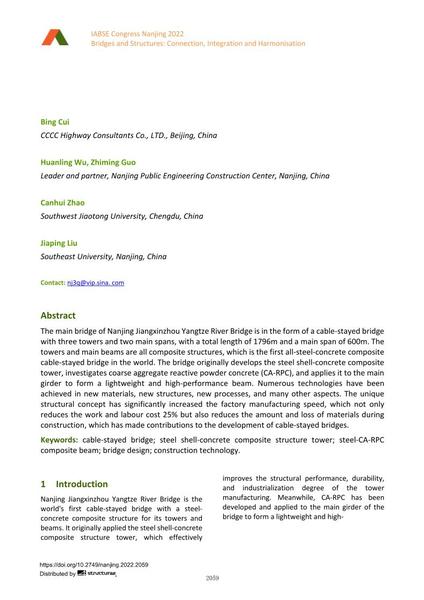Steel-concrete Composite Cable-stayed Bridge—Main Crossing Bridge of Nanjing Jiangxinzhou Yangtze River Bridge

|
|
|||||||||
Détails bibliographiques
| Auteur(s): |
Bing Cui
(CCCC Highway Consultants Co., LTD., Beijing, China)
Huanling Wu (Leader and partner, Nanjing Public Engineering Construction Center, Nanjing, China) Zhiming Guo (Leader and partner, Nanjing Public Engineering Construction Center, Nanjing, China) Canhui Zhao (Southwest Jiaotong University, Chengdu, China) Jiaping Liu (Southeast University, Nanjing, China) |
||||
|---|---|---|---|---|---|
| Médium: | papier de conférence | ||||
| Langue(s): | anglais | ||||
| Conférence: | IABSE Congress: Bridges and Structures: Connection, Integration and Harmonisation, Nanjing, People's Republic of China, 21-23 September 2022 | ||||
| Publié dans: | IABSE Congress Nanjing 2022 | ||||
|
|||||
| Page(s): | 2059-2060 | ||||
| Nombre total de pages (du PDF): | 2 | ||||
| DOI: | 10.2749/nanjing.2022.2059 | ||||
| Abstrait: |
The main bridge of Nanjing Jiangxinzhou Yangtze River Bridge is in the form of a cable-stayed bridge with three towers and two main spans, with a total length of 1796m and a main span of 600m. The towers and main beams are all composite structures, which is the first all-steel-concrete composite cable-stayed bridge in the world. The bridge originally develops the steel shell-concrete composite tower, investigates coarse aggregate reactive powder concrete (CA-RPC), and applies it to the main girder to form a lightweight and high-performance beam. Numerous technologies have been achieved in new materials, new structures, new processes, and many other aspects. The unique structural concept has significantly increased the factory manufacturing speed, which not only reduces the work and labour cost 25% but also reduces the amount and loss of materials during construction, which has made contributions to the development of cable-stayed bridges. |
||||
| Mots-clé: |
Pont à haubans
|
||||
